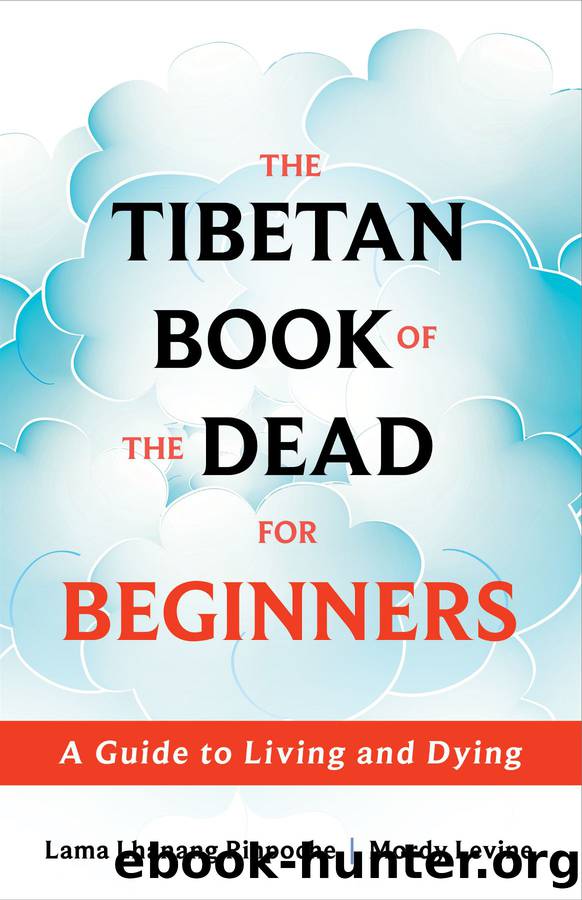The Tibetan Book of the Dead for Beginners: A Guide to Living and Dying by Lama Lhanang Rinpoche & Mordy Levine

Author:Lama Lhanang Rinpoche & Mordy Levine [Rinpoche, Lama Lhanang & Levine, Mordy]
Language: eng
Format: epub
Tags: REL007050 RELIGION / Buddhism / Tibetan, REL007020 RELIGION / Buddhism / Rituals & Practice, REL007000 RELIGION / Buddhism / General (see also PHILOSOPHY / Buddhist)
Publisher: Sounds True
The realizations of emptiness and impermanence are critical ingredients to our own happiness in this lifeâas well as in the time period approaching our death (the Bardo of This Life), as we die (the Bardo of Dying), and beyond (the Bardo of Luminosity).
Practice Developing Wisdom
Contemplating the impermanent nature of our life, our body, our environment, our friends, our loved ones, and our possessions helps to reduce our grasping nature. The more we are able to reduce our clinging to what is impermanent, the happier our life will be, and the easier our death will be.
Meditation on our breath can help our mind to absorb the impermanence of our world. We can observe our breath as it rises and falls, comes and goes, and changes from one moment to another. A sitting meditation that observes our breath helps develop the realization of emptiness and impermanence.
Observing our breath, and all of its uniqueness, and observing our thoughts passing through our minds helps us to see that everything is always changing. And thatâs reality, and thatâs okay.
With eyes closed or looking softly down, spine tall (lying down is okay if sitting is uncomfortable or painful), and body relaxed, we simply observe our natural breathing. As we inhale, we observe the air coming into our body. We can observe the air coming into our nose, or the rise of our abdomen. We can observe the air exiting through our nose or the gentle collapse in our abdomen.
When thoughts come into our mind and interrupt our observationâand they willâwe simply go back to observing our breathing, without any judgment whatsoever.
We play this âgameâ of observing our breath, being interrupted and distracted, and going back to observing our breath. We can start with five minutes a day and gradually, over weeks, increase to fifteen to twenty minutes a day. Maybe even twice a day!
With study, contemplation, and meditation, over time, our mind calms and begins to accept the reality of emptiness and impermanence. We can read books that inspire us and make us think about our lives, their meaning, and our direction in life. We can have conversations with other like-minded individuals. We can spend time digesting the teachings on love and wisdom from the great teachers of any religion.
Change is not bad or good. It just is. It does not mean that everything falls apart for the worst. Inevitable change simply means that everything is possible. As we realize this more and more, we are not surprised by change, and may even enjoy it. Ignorance of this reality is not blissâonly suffering.
Additional practices that we can incorporate into our daily lives to develop our understanding of wisdom are found in appendix A.
Download
This site does not store any files on its server. We only index and link to content provided by other sites. Please contact the content providers to delete copyright contents if any and email us, we'll remove relevant links or contents immediately.
The Way of Zen by Alan W. Watts(6601)
Ego Is the Enemy by Ryan Holiday(5415)
The Art of Happiness by The Dalai Lama(4125)
The Book of Joy by Dalai Lama(3976)
Why Buddhism is True by Robert Wright(3447)
Spark Joy by Marie Kondo(3299)
Shift into Freedom by Loch Kelly(3194)
Happiness by Matthieu Ricard(3040)
A Monk's Guide to a Clean House and Mind by Shoukei Matsumoto(2912)
The Lost Art of Good Conversation by Sakyong Mipham(2651)
The Meaning of the Library by unknow(2565)
The Unfettered Mind: Writings from a Zen Master to a Master Swordsman by Takuan Soho(2307)
The Third Eye by T. Lobsang Rampa(2260)
Anthology by T J(2207)
Red Shambhala by Andrei Znamenski(2193)
The Diamond Cutter by Geshe Michael Roach(2058)
Thoughts Without A Thinker: Psychotherapy from a Buddhist Perspective by Epstein Mark(2014)
Twilight of Idols and Anti-Christ by Friedrich Nietzsche(1892)
Advice Not Given by Mark Epstein(1878)
